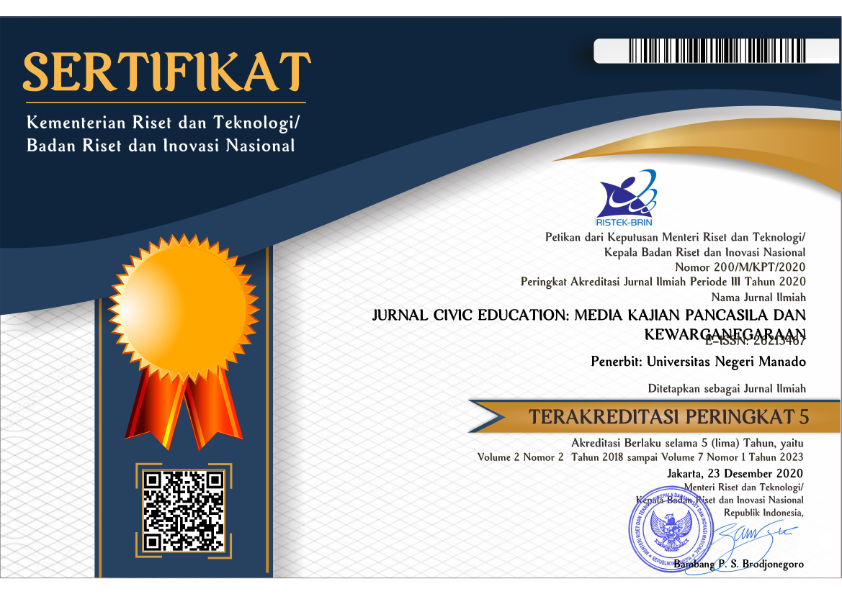Implementasi Pancasila Di era Globalisasi
 ), Dinie Anggraeni Dewu(2),
), Dinie Anggraeni Dewu(2),
(1) Universitas Pendidikan Indonesia
(2) Universitas Pendidikan Indonesia
 Corresponding Author
Corresponding Author
Abstract
Pancasila is one of the important things for the life of the Indonesian nation. Pancasila is used as the basis of the state, Pancasila is also the ideology of the state. besides that, Pancasila is also a way of life for the Indonesian nation. With the rapid development of technology, the acceleration of globalization is the same. This article will describe the implementation of Pancasila values that must be applied so that the values of Pancasila remain strong, it is necessary to strengthen the values of Pancasila to the next generation of the nation, especially for students from elementary school to tertiary level. This can be pursued by learning about citizenship and also Pancasila. This article was created to keep Pancasila as a guideline in everyday life so as to make people who believe and fear one God, have a noble character, are independent, are democratically responsible, and become citizens who uphold the values of Pancasila. This article is made with a qualitative method of collecting data through literature review with sources from various data, which contain studies on the implementation of Pancasila values in the era of globalization, such as in books, articles and journals.
References
Adi, P. (2016). Pembudayaan nilai-nilai Pancasila bagi masyarakat sebagai modal dasar pertahanan nasional NKRI. Jurnal Moral Kemasyarakatan, 1(1), 37-50.
Ariawantara, P. 2017. Implementasi Pancasila Dalam kehidupan Berbangsa dan Bernegara. Universitas Airlangga.
Asri Agustiwi, S. H. (2016). Hukum sebagai Instrumen Politik dalam Era Globalisasi. Rechtstaat Nieuw, 1(01).
Darmiatun & Daryanto, (2013). Pendidikan Karakter Disekolah. Yogyakarta: Gava Media.
Kalidjernih, Freddy K, ‘Jurnal Civics : Media Kajian Kewarganegaraan Terhadap Revitalisasi Pancasila’, 16.1 (2019), 103–10
Kariyadi, D. (2017). Membangun Kepemimpinan Berbasis Nilai-Nilai Pancasila Dalam Perspektif Masyarakat Multikultural. Citizenship Jurnal Pancasila Dan Kewarganegaraan, 5(2), 86-96.
Meinarno, E. A. Dkk. (2011). Manusia Dalam Kebudayaan Masyarakat. Jakarta: Salemba Humanika
Moerdiono. (1999). Pancasila Sebagai Ideologi, Jakarta: BP-7 Pusat
Mulyadi, Deddy. 2015. Studi Kebijakan Publik dan Pelayanan Publik: Konsep dan Aplikasi Proses Kebijakan Publik dan Pelayanan Publik. Cetakan Kesatu. Bandung: Alfabeta CV.
Musa, M. I. (2015). Dampak pengaruh globalisasi bagi kehidupan bangsa Indonesia. Jurnal Pesona Dasar, 3(3).
Nasution, A. T., Harahap, N. H., & Rambe, A. A. Makalah Pancasila sebagai dasar negara Indonesia.
Nofriandi,R. 2016. Implementasi Peraturan Walikota. Tesis: Universitas Medan Area.
Sapriya, Dkk. 2001. Konsep Dasar Pendidika Kewarganegaraan Edisi Revisi. Laboratorium Universitas Pendidikan Indonesia.
Sugiyono, (2013). Metode Penelitian Kuantitatif, Kualitatif Dan R & D. Bandung: Alfabeta.
Soeprapto, S. (2016). Implementasi Pancasila Dalam Kehidupan Ber Masyarakat Berbangsa Dan Bernegara. Jurnal Ketahanan Nasional, 10(2), 17-28.
Somantri, G. R. (2005). Memahami Metode Kualitatif. Makara Sosial Humaniora VOL. 9, NO. 2,, 57-65.
Article Metrics
Abstract View : 1332 times
: 1332 timesPDF (Bahasa Indonesia)
 Download : 203 times
Download : 203 times
DOI: 10.36412/ce.v5i2.2595
Refbacks
- There are currently no refbacks.
Copyright (c) 2021 Jurnal Civic Education: Media Kajian Pancasila dan Kewarganegaraan

This work is licensed under a Creative Commons Attribution-NonCommercial 4.0 International License.











